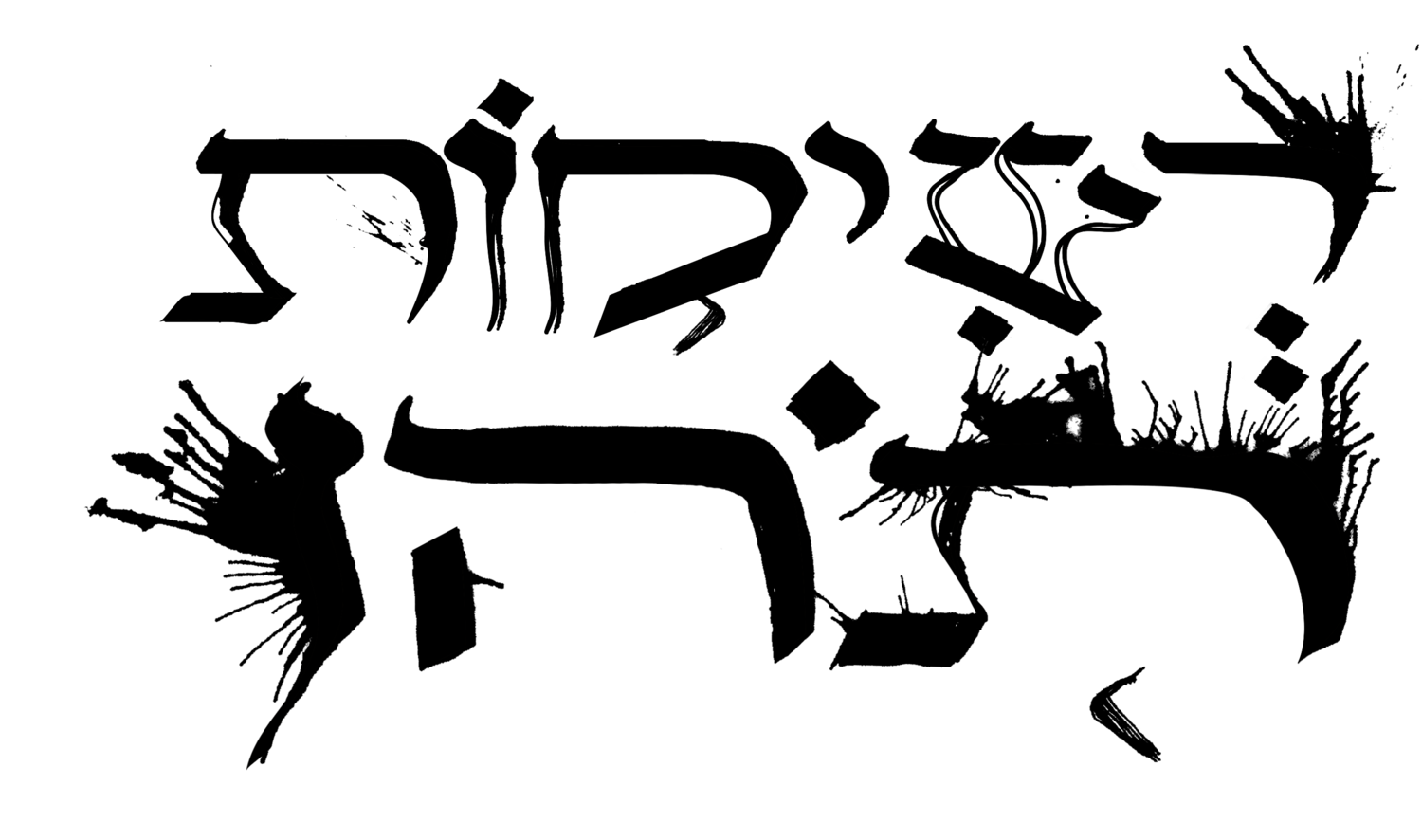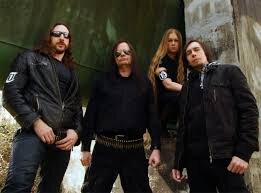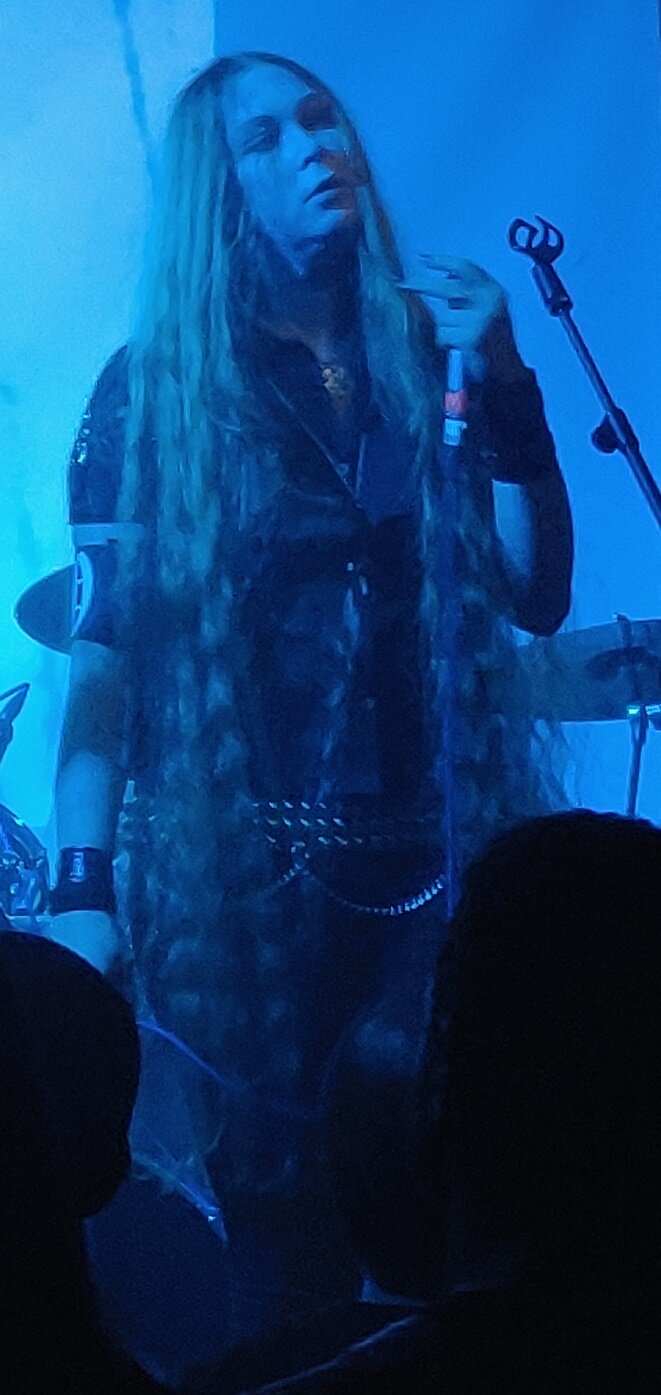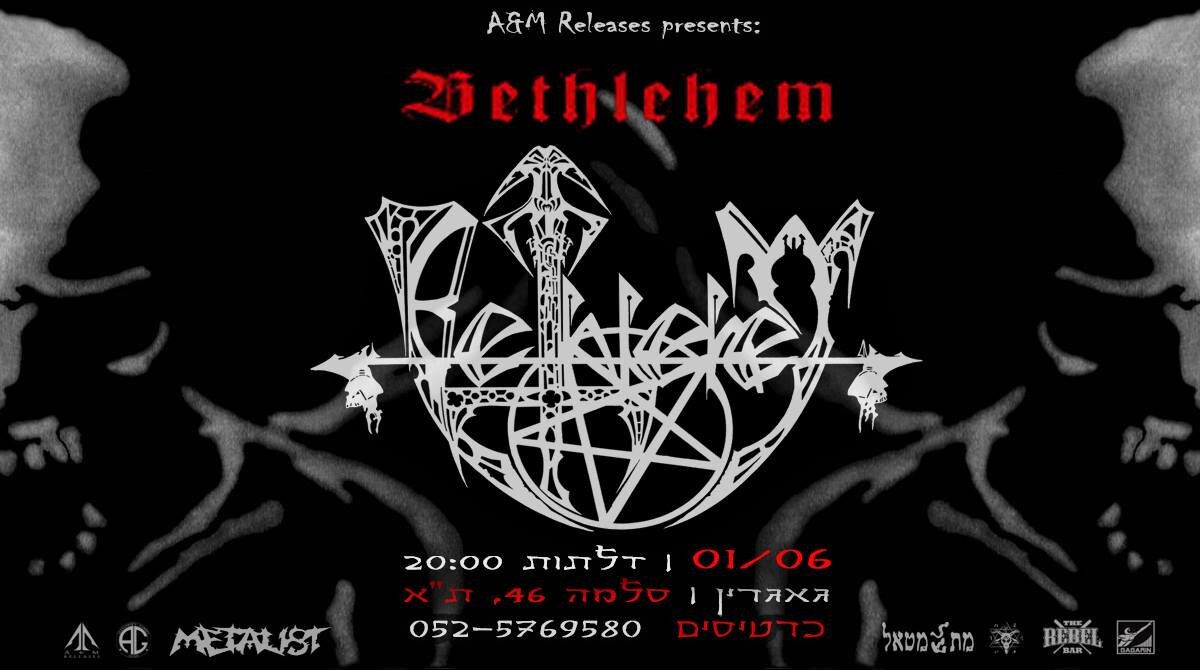ראיון עם Jürgen Bartsch מלהקת Bethlehem | מאת: טל עידן סייעו בהכנה: נופר ברטשניידר-שטרצר, נועה ארצי, יוסף בן עוז
The Aversion of a Rectilinear Life
Interview – Jürgen Bartsch of Bethlehem
First of all, Thank you very much for taking the time to do this interview!
You're welcome !
1. Now that "Lebe dich leer" is out, could you elaborate on the ideas standing behind its concept and maybe some words about the working process?
Well, basically all these songs were written by Karzov shortly after the 2016er “Bethlehem” album got released and we already flirted with the idea using these for another full album which finally resulted in “Lebe dich leer”. Especially ‘cos these moods & atmospheres perfectly fitted my lyrical concept which was about emptiness in all its (life) forms by enormously wasting oneself without compromises. Without regrets regarding consequences. This pretty sinister point of view is reflecting on my life, I lived for years.
Mother & Father of NSBM - Bethlehem (picture take by: Alexandra Kürten)
2. One aspect which differentiates Bethlehem From most Metal bands, is your unique lyrical theme – which is very personal, introspective, while being highly abstract and enigmatic in its dismal spectrum. Not only had it never deterred your listeners, it rather attracted them as they found themselves strongly relate to the overall atmosphere. What, in your opinion, might be the reasons for this?
I reckon that the aversion of living a controlled & inevitably rectilinear life isn't just for myself but for others as well. Which certainly should be the main reason why many people find 'emselves related to the affidavit atmosphere based on life experience as well as experiments of all kinds in general. This wider lyrical spectrum is chosen on purpose just to give space enough for interpretation of all kinds. One definitely doesn't have to be close to me to realize the intention behind. Sure, my best friends or people who are close have a better overview or let's say an ability to decrypt my lyrics in the most possible ways ‘cos they've been part of what got narrated in these.
3. Speaking of lyrical themes: In your older works, the lyrics were inspired by your personal vision of "Alexander Welt" – a bizzare nightmare-ish world of morbid images and experiences. What is the origin of this conceptual direction? To what extent do you find this thematic world still present in Bethlehems’ music in 2019?
Onielar - “Light-years above all othe Bethlehem’s vocals”
It no longer is present in our nowadays music. Simply ‘cos I got rid of drugs. These “Alexander Welt” times were the peak of drug abuse in combination with self destruction and reflected on anything but a certain lifestyle. Reality & delusion went hand in hand with a rational mind which no longer could focus on the difference.
4. Looking back at your discography, one can trace possible "Trilogies" in the evolution of Bethlehem: The first three LP's ("Dark Metal", "Dictius Te Necare","S.U.i.Z.i.D") displayed its own concept; Then, the following three ("Schatten aus der Alexander Welt", "Mein Weg", "Hexakosioihexekontahexaphobia"), which featured a different approach which I'll discuss later on, And recently, the self-titled album from 3 years back and the latest "Lebe dich leer". Will there be third album to complete some sort of a "circle" and to form a trilogy?
Absolutely ! Although the “third” chapter of our creative work no loner is following any rules like trilogies and thematically is no longer based on concepts as well. Therefore, it easily could happen that there would be a 4th, 5th etc. albums ‘cos we no longer succumb (to) creative limitations. Otherwise we've to finish with our band after the 3rd album got done which definitely isn't wanted. And isn't needed anyways.
5. I am curious: The vocals on most of your works, but especially on “Dictius Te Necare”, have a somewhat darker tendency, tipping towards something most resembling insanity or madness. It attributes an ‘on the edge’ feel to the entire album. What’s behind this vocal extremity? Is it more desperate or more powerful in your view? or maybe both?
I honestly have no idea, this all happened decades ago and personally I no longer can remember these times so well. Regarding a powerful voice I must say that Onielar's voice is light years more powerful than Landfermann's for example, especially ‘cos she easily can perform this power at live shows either. Which never was possible with Landfermann in the past who already “died” after three songs in the rehearsal room and who was ill for at least a week afterwards.
6. In an interview you gave quite a few years ago, you’ve stated that "The inverted cross in Bethlehem's logo helps maybe selling records and nothing more". However, the metal scene has gone through vast changes since then, and nowadays it is not rare at all to pour unorthodox meaning into "traditional" symbols. Having said that, can one say that the general symbolism in Bethlehem's logo has a specific meaning nowadays?
Symbols. They are meaningless.
I dunno. This all is totally overrated in my opinion. A logo is nothing but a brand to identify a product with. Like in McDonalds for example and I'm bloody certain that no one ever was searching for a symbolic meaning behind (it)? This always got on my nerves a lot to be honest, to identify creativity based on music/lyrics with a (many times) silly looking logo which says absolutely nothing about the artist in general. Except boredom maybe.
7. Back in the 90's, Bethlehem was heavily associated with Suicide, an issue that can be learned from the title of the second album, its dedication "to all suicide victims" and the acronym of the following album. From a certain perspective, the band can be seen as pioneer and a significant inspiration to the sub-genre that is now known as "Depressive Suicidal Black Metal" or "DSBM". What are your thoughts about this notion? Do you have any insights regarding this sub-genre?
Sure. It all started in the end of the 90s when Matton & myself got in contact with Andreas “Leere” Cassado of Silencer & Niklas Kvarforth of Shining via the local internet cafe. Both, Shining as well as Silencer wanted to hire Bethlehem or ex-Bethlehem members for their debut albums. Shining wanted Andy Classen for the vocals and Silencer (wanted) Steve Wolz for the drums. So Classen went to Sweden and myself & Steve joined the recordings of “Death Pierce Me” from Silencer which was completely written by “Leere” (NOT Nattram !). Steve recorded the drums for that album. However, there was a strong relationship between these bands and ourselves but personally I pretty quickly lost the interest on this DSBM thing when more and more bands appeared out the blue. And still do until today. One really can't be in contact with them all and we already have lost the overview in the end of the 90s/beginning of the Millennium. But obviously we never would deny the fact that we were the forerunners of the DSBM genre based on Swedish die-hard-fans from the past which got bigger with their own bands, though. Life is strange.
8. As mentioned above, the second "trilogy" featured a different approach in Bethlehems’ songwriting, which materialized in the use of clean singing, elements from experimental rock, trip-hop, electronics etc. Looking back, what was the artistic/personal motivation underlying these musical elements?
The music itself. From the bigoted metalhead I was when I was 15 years old I progressed into something more open minded with every piece of music I've listened to since that time. Without limitations of course. In the meantime I've also learned how to play my instrument(s) right, and not exclusively have experienced heavy metal as you might be able to tell. Either (also) my songwriting has progressed too and since I'm following my very own interpretation of satanism I'm just doing what I want. No matter what the rest of the world thinks about (it). Without such an attitude even albums like “Dictius Te Necare” or “Dark Metal” never would have been written ‘cos they didn't follow any rules or traditions either. Basically all music or lyrics I ever wrote were done for just myself, there never was any pressure based on commercial or mainstream methods. Certainly a reason why I could stay artistically free. Fortunately. Without any urges of justifying my art in the public. I do what I want, that's my main motivation.
9. (Regarding the previous question): Do you see the current stage in Bethlehems’ evolution as a progress, ‘one step further’?
Not really. Nothing was ever constructed but always happened automatically without thinking about it. Based on a certain lust for producing music in general. As I said before, Bethlehem isn't following a mainstream aspect or would be liable (for) producing an album on pressure.
10. How would you describe your personal development as an artist and as an individual in general, considering the role of Bethlehem in your life?
As a pretty natural one regarding just the artistic aspect behind. Even certain circumstances couldn't suspend the flow. Unfortunately a lot of willpower was needed here and there to realize different goals but basically never destroyed the superior scope of a natural working ratio. It should be crystal clear that fighting windmills would be nothing but a logical consequence.
11. Despite your unquestionable influence on Bethlehem, being a founding member and exclusive lyricist, it never felt like a "project" but rather a full-out band, an entity on its own. How might you explain that? Is there a usual dynamics between you and the other band members, present and past?
You're right, there always was, more or less. Dictatorship was part of it too and until today I still make the final decision and still produce our albums in cooperation with the studio engineer(s). Liberalism doesn't work in any band around although democracy would have been possible from time to time. Artistic freedom wasn't just for myself, any member always had the opportunity to express him or herself any wanted way. I many times before spoke about the principle of no limits or odds in general. We are what we are and wouldn't follow anyone or anything. A dangerous tool if you may ask me ? Some of us haven't gotten it right which resulted in a usual hubris. A common thing not just in Bethlehem I reckon. These people directly got dislodged and never were to be seen elsewhere again. Of course not, these subjects were only loud with their mouths and weren't made for an “entity on its own” as you mentioned it.
Liberalism doesn't work in any band around
12. In 2009, the band re-recorded the classic “S.U.I.Z.I.D”, aided by Niklas Kvarforh on vocals. What was the rationale behind this bold move? Why did you choose Kvarforth, known notoriously for scandals that shadows his musical repertoire? Was this the reason for translating the lyrics into English? The album was not received well in the scene, if to put it mildly – what are your thoughts on this and its place in your discography?
Strange enough that the entire product could be sold out within some weeks. Seems like two thousand people just bought the album for washing their dirty laundry in the public isn't it ? I wouldn't say this was my best idea ever. An idea which was based on a spontaneous impulse. Niklas was on a visit in my house, Matton joined us, Steinhoff joined us. We had some drugs together, went to the re-room, played the album, recorded it on a one track tape recorders and released it via Red Stream, the album got sold almost immediately, no one made a profit nor a loss. Would I do it again ? Probably not ! Other than that, I don't care about Niklas' so called scandals ‘cos I'm not responsible for him. Absolutely no one got “chosen” for certain actions anyways, 4 completely hammered guys had a wicked idea at a Sunday afternoon, end of story.
13. Let's talk about live shows. What part do they play in Bethlehems’ overall experience? Do you consider them as an extension of the recorded material, or do they have a status of their own? Do you try to make them stand out, in comparison to the albums?
This is a pretty much trivial thing I guess. We basically play live shows to celebrate our music, presented on our albums, with our fans. Obviously we can't perform them everywhere at any time ‘cos we're no pro band living from our music and therefore have different obligations as well. We're sorry but can't or don't wanna change this. Seeing us live means you've to travel. We work a lot for the few live shows we play, almost each of them is a spectacle which wouldn't disappoint you. Most songs we perform are new ones but old ones from the early days will get featured as well. Additionally we strengthened ourselves with a 2nd Live-guitarist knows as Velnias of Dakened Nocturn Slaughercult, playing 8-string guitars as well. A pretty powerful line-up, come and watch us!
14. Would you like to share the plans in store for Bethlehem's future?
Sorry to say but there are no plans, we just follow ourselves, goals would be contra-productive, disturbing the flow. Things are going to happen the way they're supposed to be, everything else would result into a catastrophe the sooner or later.
15. In the early-mid 2000s, you were involved in a dark-industrial project called "Stahlmantel", which released two EP's. What part can you say it took in your artistic aspirations? Have you any thoughts about resurrecting it?
I wish I could but there's no chance at the moment. I'm too much involved into Bethlehem again and I can't do things desultory. 100% or nothing. But this wasn't for nothing as well ‘cos I use my electronic experiences I made with “Stahlmantel” for Bethlehem as well. Electronica was always an important part for Bethlehem's music.
16. A strange question perhaps: If given the chance, which artist (dead or alive…) would you find most interesting for you to collaborate with?
Brian Wilson.
memories of the show in Tel-Aviv…
17. We have reached the end… Thank you very much for this interview! It will be a pleasure if you will depart with final remarks, if you have any. See you soon!
In the name of us all: Thank you for the GREAT support in Tel Aviv guys, it was us a real pleasure !






